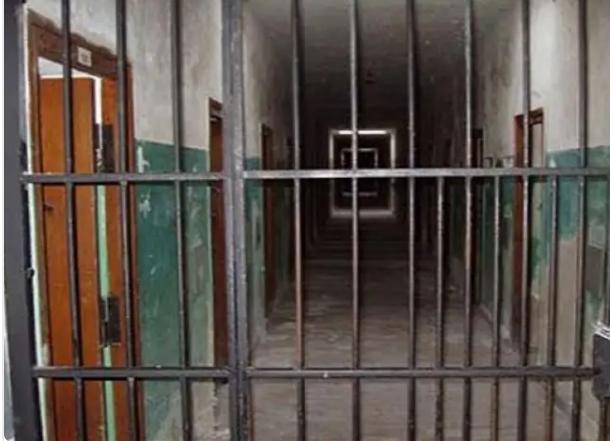News
Why 3,298 Inmates Are On Death Row In Nigeria — Correctional Service

The Nigerian Correctional Service has said that inmates on death row was as high as 3,298 in prisons across the country because of the increasing number of human rights groups.
According to the Prisons, this has discouraged governors from signing the death warrants of prisoners on death row.
The Public Relations Officer of the Service, , Mr Abubakar Umar, who disclosed this in Abuja, however, also said the term “condemned criminal” had been abrogated.
He said governors now shy away from signing the death warrants of inmates on death row to avoid attacks from the human right bodies.
READ ALSO: Delta: Tricycle Driver Crushed To Death On ‘One-Way’
Umar noted that many inmates on death row, IDRs, had been executed in the past before the proliferation of the activities of the human rights groups and organisations.
He said: ”Currently, there is somewhat a kind of moratorium on execution of offenders.
“Before the moratorium on execution of IDRs became widespread, executions of IDRs were being carried out as and at when due.
“But with the rising activities of human right groups, many governments shy away from signing the death warrants of these offenders.
“Though it is still in practice, it is not common as it used to be. The last execution of IDRs was carried out in 2016 in Edo.
READ ALSO: Man Commits Suicide In Delta Community Over Wife’s Separation
“We encourage state governors who shy away from signing the death warrants, to commute them into other sanctions.”
According to him, with the emergence of the NCoS Act 2019 which made the prisons correctional centres, the term “condemned criminal” has been abrogated because of its stigmatising nature.
He said the prisons service preferred to use a more friendly term of ‘inmates on death row, IDR’, pointing out that death sentences were not always carried out immediately they were imposed.
Umar said: “There are often long periods of uncertainty for the convicted while their cases are being appealed at higher levels.
READ ALSO: You Goofed Saying Biafra Is Dead, Buried, IPoB Replies Obasanjo
“Some offenders have been executed more than 15 years after thir convictions.
“They were basically awaiting the hangman’s noose in our custodial centres after being found guilty of capital offences.
“We have quite a number of them; as of today, we have a total of 3,298 inmates on death row. They constitute about 4.5 per cent of the total number of inmates in our various custodial centres nationwide.”
According to Vanguard, the service scribe said some IDRs had been in custody for many years, adding that some had been there since they were arrested up to when they were tried and sentenced.
READ ALSO: Wike Suffering From Post-election Trauma – Dino Melaye
According to him, many of them committed capital offences such as culpable homicide, armed robbery and terrorism, among others.
“The good thing is that we engage all of them in activities that will reform and modify their behaviours. The goal is to make them better citizens of the nation.
“We also make them undergo personal development programmes as anger management, civic education as well as entrepreneurship.
“Some of them, who do well and show some glimpse of hard work, industry and discipline, are recommended for clemency to the relevant authorities,” he said.
News
Edo SWAN Distances Self From Online Publication Against Enabulele

…demands retraction, warns member against unverified publication
The Sports Writers Association of Nigeria (SWAN), Edo State Chapter, has distanced itself from an online publication titled: ‘Samuel Ogbemudia Stadium Shut Against Stephen Keshi.’
A statement signed by the Secretary of the association, Comrade Idahosa Moses, Edo SWAN said neither was it consulted nor involved in the “framing of the narrative presented by the online publication.”
Edo SWAN described the publication as misleading, sensational and grossly lacking in factual balance.
The statement partly reads: “SWAN finds the report inconsistent with the ethical standards and core values of the journalism profession.
READ ALSO:SWAN Orders Nationwide Boycott Of NFF Activities
“While Edo SWAN recognises and respects the sentiments expressed by Mr. Austin Popo, Secretary of the Board of Trustees of the Stephen Keshi Football and Vocational Training Centre (SKFTVC), concerning the challenges encountered in securing the use of the Samuel Ogbemudia Stadium for this year’s Stephen Keshi Memorial National Under-17 Soccer Tournament, it is imperative to state that such concerns should not be reported in a manner that imputes motives, assigns blame without verification, or portrays public officials as acting in bad faith.”
On allegations against the Executive Chairman of the Edo State Sports Commission, Hon. Amadin Desmond Enabulele, in the publication, SWAN described Enabulele as a “seasoned professional with a proven track record of integrity and dedicated service to sports development in Edo State.”
“Any insinuation that he or the Commission deliberately acted to undermine the memory and legacy of the late Stephen Okechukwu Keshi is not only unfair but also unsupported by verifiable facts.”
Edo SWAN, therefore, “strongly cautions the publisher of Popular News to desist from publishing unverified and inflammatory reports capable of misleading the public and damaging reputations.”
READ ALSO:Botswana’s New President Sworn In As Voters Kick Out Ruling Party Of Nearly Six Decades
“The Association formally demands that the controversial publication be withdrawn immediately and that an unreserved apology be tendered to Hon. Amadin Desmond Enabulele.”
SWAN further “extends its sincere apologies to the Chairman of the Edo State Sports Commission, who is also a Patron of the Edo SWAN Chapter, for any embarrassment or misrepresentation arising from the said publication, and assures him of its continued respect, support and cooperation.”
Edo SWAN, while stating that it “shares in the collective responsibility of preserving and honouring the legacy of the late Stephen Keshi—a national icon whose contributions to Nigerian football remain indelible—the Association, maintained that “this noble course must be pursued through constructive engagement, professionalism and mutual respect among all stakeholders.”
Edo SWAN, thereafter, warned “all sports writers in the state to avoid unverifiable reports and sensationalism, stressing that any member found culpable of professional misconduct will be decisively sanctioned in line with the Association’s statutes.”
News
Court Dissolves Petitioner’s Marriage Over Lack Of Love, Care

An Area Court sitting at Centre-Igboro, Ilorin in Kwara State, on Thursday, dissolved the four-year-old marriage between Aminat Mustapha and Wahab Adeshina, following the petitioner’s insistence.
The petitioner told the court that she was no longer interested in her marriage to her husband following claims of lack of love and care.
According to the News Agency of Nigeria (NAN), while delivering ruling, the presiding judge, Mr Toyin Aluko, held that the respondent had written to the court, accepting the divorce application made by his wife.
READ ALSO:Why I Charged My Husband Money For Sex —Woman
Aluko, consequently, dissolved the marriage between the parties, and ordered the woman to observe one month iddah (waiting period) before she could remarry.
Meanwhile, the court granted custody of the two children in the marriage, ages one and three, to their mother.
He ordered the father to pay a monthly sum of N20,000 for the children’s feeding and maintenance.
The court also held that the respondent will be responsible for their education and healthcare.
Again, the court held that the father has unrestricted access to his children, but at reasonable time adding that he should be notified before any decision is taken on his children.
The judge ordered the petitioner to get a copy of the judgment and send same to the respondent.
News
Tinubu Embarks On Three-state Visit

President Bola Ahmed Tinubu will depart Abuja on Saturday on a working visit to Borno, Bauchi and Lagos.
This is contained in a statement issued by Presidential Spokesperson, Mr Bayo Onanuga, on Friday in Abuja.
While in Borno, the President will commission projects executed by the Borno State Government under Gov. Babagana Zulum, in collaboration with the Federal Government.
He will also attend the wedding ceremony of Sadeeq Sheriff, son of former Borno Governor, Sen. Ali Modu Sheriff, and his bride, Hadiza Kam Salem.
READ ALSO:Ambassadorial Nominees: Ndume Asks Tinubu To Withdraw List
From Maiduguri, Tinubu will proceed to Bauchi State to condole with the state government and the family of Sheikh Dahiru Bauchi, the renowned Islamic cleric and leader of the Tijjaniyya Muslim Brotherhood.
Sheikh Dahiru Bauchi died on Nov. 27.
After the condolence visit, the President will travel to Lagos, where he will spend the end-of-year holidays.
During his stay in Lagos, Tinubu is expected to attend several engagements, including the Eyo Festival scheduled for Dec. 27.
The festival, to be held at Tafawa Balewa Square, will honour notable personalities, including the President’s late mother, Alhaja Abibatu Mogaji, former Lagos State governors Alhaji Lateef Jakande and Chief Michael Otedola.

 Metro4 days ago
Metro4 days agoAlleged Organ Harvesting: Bereaved Families Rush To Check Corpses

 News5 days ago
News5 days agoForest Reserve: Okpebholo Broker Peace Between Host Communities, Investors

 News4 days ago
News4 days agoPolice Confirm Edo Tanker Explosion, say No Casualty

 News3 days ago
News3 days agoFormer Delta North senator Peter Nwaoboshi Dies

 Metro2 days ago
Metro2 days agoJUST IN: Former Edo Information Commissioner Is Dead

 News4 days ago
News4 days agoEdo SSG Calls On Media To Support Govt Policies, Assures Better Welfare

 News3 days ago
News3 days agoGrassroots To Global Podium: Edo Sports Commission Marks Enabulele’s First Year In Office

 News4 days ago
News4 days agoOtuaro Tasks Media On Objective Reportage

 News4 days ago
News4 days agoIPF Hosts Media Conference, Seeks Protection For N’Delta Environment

 News4 days ago
News4 days agoOkpebholo Sympathises With Otaru, People of Auchi Over Tragic Tanker Fire Incident


















